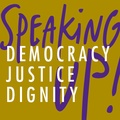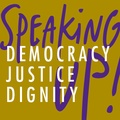Marjorie Chan and I sat in the teal blue armchairs in my apartment nibbling rice crackers and sipping green tea. I’d seen her harrowing play, A Nanking Winter, a few months earlier. It addressed one of the roots of the ongoing animosity between China and Japan—the deep historical traumas of Nanking, 1937.
When we began the conversation, we were simply two writers, one young, one old, one of Chinese ancestry, one of Japanese, and from our great distance of time and space, we were far from The Rape of Nanking. Here in 21st century Canada, we could be friends in spite of a past to which we were connected by birth, though not by choice. Blessed space, oh Canada.
But I was fully conscious of being identified with culpability. As a person of Japanese ancestry, I would stand with the people who were harmed by Japan. And I would make common cause with their advocates in Japan, whoever they might be, seeking to atone for Japanese crimes.
“I’m ashamed to be Japanese,” a visiting journalist from Japan had once said to me. I knew the feeling well. It was burned into me as a child.
There are ways to address that shame—by art, by apologies, redress and reparations, by an outpouring of grief from the nation of the perpetrators, by monuments, by education. Germans faced the horrors of the Nazi legacy and did the moral work required. It’s a crime in Germany to deny the Holocaust. There were films. The Nasty Girl, The Garden of the Finzi Continis. There’s hardly anything comparable in Japan that I am aware of.
Marjorie’s play was my introduction to The Rape of Nanking, The Forgotten Holocaust of World War II, a groundbreaking book when it was published in 1996. I didn’t want to admit how little I knew about the book or its author, Iris Chang. When she wrote her best seller, she was only in her twenties! Her twenties! So young to take on that ordeal. And then, after immersing herself in the unthinkable, to face the utterly revolting reaction from Japan. Instead of shame, instead of abject apology and grief, instead of honouring her for her courage, attempts were made to discredit her. (It’s not true. It’s Chinese propaganda. The caption of a photo is wrong. It’s an exaggeration. No, no your Honour, we didn’t kill that many people. Only…Well maybe just…We didn’t do those terrible things. No no. Only…Only just…) And then I remembered hearing that the author had committed suicide. And what was my mental state when I heard this? Did I hope the controversy would die down? Do I remember hoping this? Was my heart with the victimizer? With shame, with disgust, I have to admit that it was. I didn’t want to read the book or hear anything more about it.
“Maybe she died because of the sheer horror of what she discovered,” I said. “Maybe she couldn’t get it out of her mind.”
“I couldn’t get her out of my mind,” Marjorie said.
I have a tree inhabiting me. Marjorie was inhabited by the young, tormented author of The Rape of Nanking. The long, long shadow of Japanese militarism reached across the ocean into the room with its chill. It could have been relatives of mine who’d killed relatives of Marjorie Chan and Iris Chang.
We stepped back from the chasm. The subject of Japanese atrocities was not raised. We did not know each other well enough to be comfortable in silence and we filled the space with chatter. Why were there so few stories about Asia on the world stage? Were Asian people not storytellers?
Then into our conversation fell that much fraught word, holocaust, used in the title of Iris Chang’s book—The Rape of Nanking—The Forgotten Holocaust of World War II.
Looking back on that conversation I see now that the word was written on litmus paper. A test word. A word of light and truth for the wisps to traverse or a word of stone to batter and waylay the flyers.
“What does ‘holocaust’ mean to you?” I asked Marjorie.
In one howling scene in her play, Irene Wu, a young author, is doubled over in shock and distress. It’s the day of her book launch. The books have arrived. The publisher, cool, academic, tells Irene that the title of her book was changed. The Nanking Holocaust is gone. The work is now The Nanking Incident.
“‘The Nanking Incident!’ Incident?”
It was laughable. “Yeah.”
This scenario is not so far-fetched in an era of authorial chimera and the dictates of market forces.
On stage, Irene Wu is beyond herself. All the suffering to which she attests is wiped out by one word change. Screaming, pulling at her hair, Irene thrashes out blindly. This is a woman over the edge.
Marjorie’s beautiful large almond eyes were looking up at the ceiling, searching. “What does the word mean to me? It’s a religious term—whole burnt offering—but for me, for most people, it means the worst atrocity in human history, the worst of the worst, the worst massacre, the worst evil. It means the deepest of the depths of human depravity. But that word, the sound of it especially—it’s the way that combination of syllables and those consonants come together. They evoke something much deeper and bigger than…than the Jewish Holocaust for me.”
“Deeper and bigger?” I asked. “You’re saying that what happened at Nanking—that was just as bad as the Holocaust? The worst of the worst?”
“Yes, and Rwanda and Darfur and Cambodia, those were also the worst of the worst.”
“But the argument is precisely—at least according to a rabbi I know—that not everything can be a holocaust because then nothing is the Holocaust. Capital H. Not every day can be Christmas. And Holocaust now means—well, what does it mean? Some people say it’s entirely appropriate to have a religious word because it created a religious crisis. After two thousand years of Christianity—how could this happen? And in a Christian country. It’s the where-was-God question. That’s the reason the word needs to be reserved for Jews. My rabbi friend says there’s a tinge of Holocaust denial if others…You’re shaking your head, Marjorie. You’re so frontal about this.”
“My point is, Joy, that every holocaust is the worst. If you try to own that space it’s like trying to take out a copyright on victimhood, on pure victimhood, and no one else is allowed to make that claim. And what then of all those millions of others—homosexuals, the mentally ill, the disabled. The gypsies, the Romanis were part of the Holocaust initially. Once we exclude people, once we start to assign certain numbers and certain acts and certain events to certain words and to certain groups, we are essentially ranking these atrocities against each other. It diminishes everything. It actually means that one person or ten women in Darfur don’t matter. How many women of Darfur are equal to how many women in Bosnia? Is a rape equal to a beheading? These are ridiculous comparisons.”
“So claiming one tragedy as the most tragic—are you saying it’s not fair, not right?”
“Not right? I’m thinking of what you said earlier, Joy, that Nanking was built on lie upon lie.”
“You think there’s a lie involved in all this business of that word?”
“I feel that there is certainly misdirection and untruth, which can only compound the problem and the suffering. If non-Jews use the word ‘holocaust’ and are being perceived as Holocaust deniers, it’s just certainly not the point. We no longer are actually talking about atrocities.”
“What are we talking about?”
“About a personal battle of wills over words.”
“Are you suggesting that it’s more to the point to consider what’s common to us, rather than what’s unique? That we need to make common cause?”
“We need the words, all the words there are for all that suffering—that terrible, terrible suffering. And if we create a world where only some people can be heard, and only special people can have certain words—I mean, everyone is special and no one is special—wasn’t that the lesson of the second world war? And people shouldn’t be denied the tools they need for healing.”
“So what can people do if they’re not allowed to use the word that means, ‘the worst of the worst?’” I asked. “Maybe we could say of Nanking, ‘that for which there is no word.’ And of Nagasaki, ‘that for which there is no word.’ And Armenia. Can you imagine what it feels like to be an Armenian and still to have Turkey denying you the right to the word ‘genocide?’ I don’t think any Armenian is saying their genocide was the most special, even though it was special in that it was the first of the century.”
“Well, of course it was special,” Marjorie said. “That’s my point. Every genocide, every holocaust, every massacre is special. There’s no gold medal, no Olympics of victimization. My point is that this battle for specialness and for special words—to me, it’s a lack of caring for others.”
Her phrase hung in the air. A small red balloon. A sign that caring is what we need, following us wherever we wander. We fight over owning words to show how much we care for our own and too often how little we care for others. Uncaring was at the heart of the Holocaust. It was in the world then. It’s in our world still.
* “From Gently to Nagasaki” will be published in The Asian American Literary Review , Issue 2. AALR is a not-for-profit literary arts organization. To learn more about it or purchase a subscription to the journal, visit online at www.asianamericanliteraryreview.org, or find them on Facebook.
© 2011 Joy Kogawa






